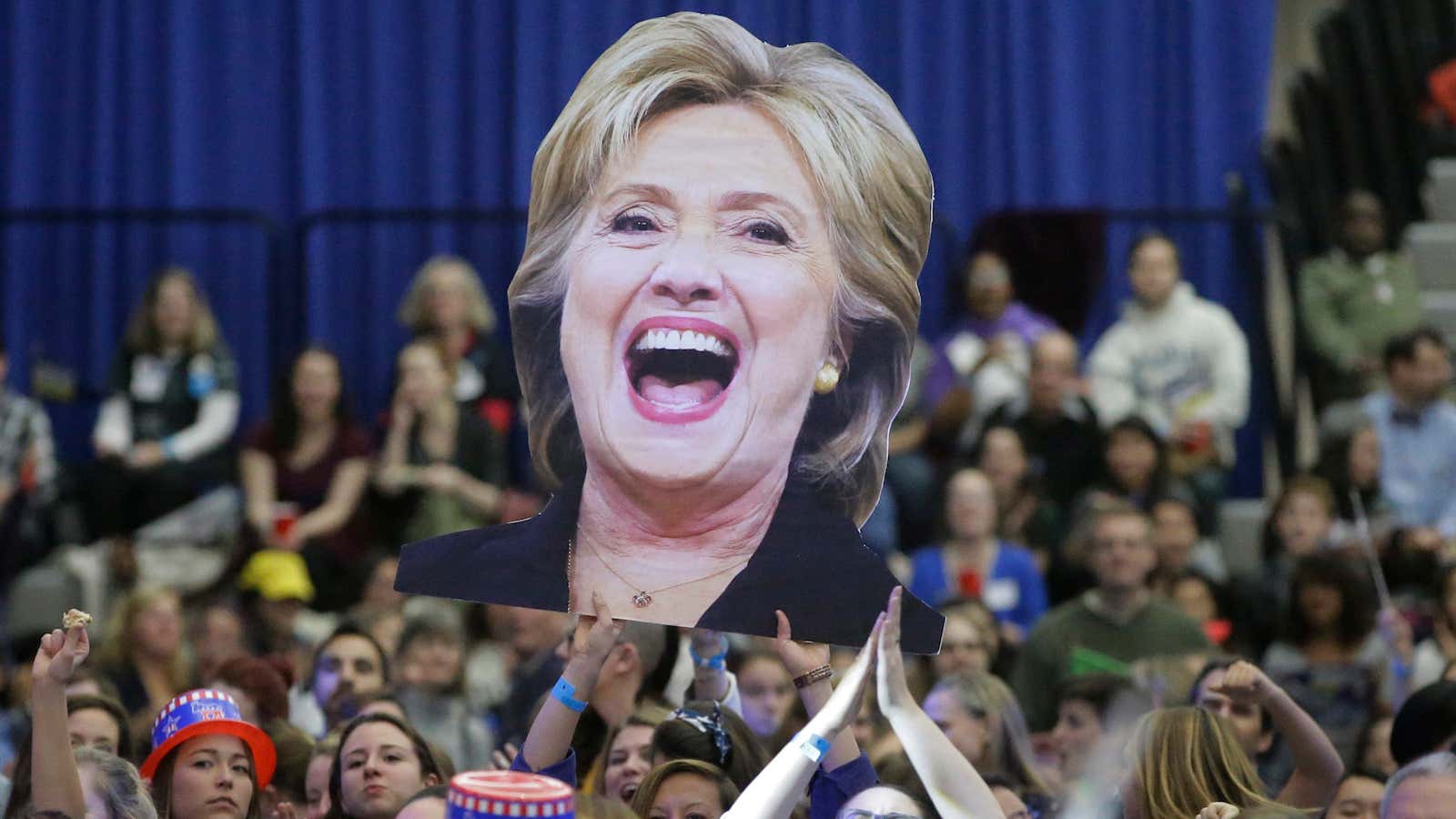Our hearts broke at around 10pm. Condolences came in over WhatsApp and text, little beeps of confusion in a huge and silent hall packed with cardboard cut-outs, inspirational quotes about achieving the impossible, and cupcakes decorated with shards of boiled-sugar “glass.”
Three thousand women, including myself, had traveled from distant states and countries to watch the Nov. 8 vote count at Wellesley College, in suburban Massachusetts. Balloons marked gathering points for those who’d graduated from the women-only college in the 1950s, 1960s, and 1970s. Younger alums buzzed around them in awe, trying to imagine making a life in America before the Civil Rights Act or Title IX. Now everyone sat in shock or wandered red-eyed outside and into the dark, as state after state turned red for Donald Trump.
Hillary Clinton was perhaps the most qualified US presidential candidate to ever run for office. Her experience in the White House, State Department, and US Senate remains unparalleled, and her political acumen dates all the way back to her senior year at Wellesley, in 1969. Just 21 years old then, Clinton made national headlines for an improvised commencement address that rejected political quiescence and called for courage from her embattled generation. And the American public gave her chair in the Oval Office to a reality television star.
As the idea of a Trump victory set in amongst the Wellesley women watching the exit polls, everyone seemed to be thinking the same thing: If Clinton isn’t good enough to break the highest and hardest of glass ceilings, what woman is?
“What more do people want?” exclaimed one alum from the class of 1976, who’d flown in from San Francisco just to celebrate.
For some, it already had felt like an indignity to see the former US secretary of state share a debate stage with Trump, a man with no relevant experience who had openly rejected one of the basic tenets of American democracy: the unquestionably peaceful transfer of power. What was there to compare?
“Nothing comes easy for women. Everything that is worth doing takes work,” Madeleine Albright reminded the nervous audience via Skype on election night. It was meant to be a hopeful message. Albright, a 1959 Wellesley alum, was the first woman to become US secretary of state. She had done the work. At that time in the evening, no one really believed that sexism—with racism, nativism, and good old-fashioned fear—would ultimately obscure the difference between a seasoned legislator and a showman.
I went to Wellesley for college because I was curious what a world run by women would be like. I don’t know if I will have the chance to feel that again. But I can tell you that it did feel different to be at the center instead of the margins for those four years—and for a brief, bright few hours on election day. The college’s government and president have always been women, and the experience is designed specifically for women, from the syllabi to the steps of the science center, which are scaled to a woman’s stride. It’s a bubble, but one that sends a disproportionate number of women into real-world C-suites.
Like many alums, I believed a Clinton presidency would create a similar experience for all American women. I hoped she would set a standard in which women were expected to compete vigorously, to ask for the best jobs and salaries, and to demand accommodation for their basic needs.
“I tear up thinking about what it will be like if/when she wins, because it will be a validation of everything Wellesley inculcates in us—to lead, to serve, to think,” ’06 alum Pam Hill told me, before the vote came in. “A part of me dreams that a Hillary presidency would be an extension of that Wellesley bubble, the one in which women learn to be unapologetically themselves.”
You don’t have to go to a special school to understand the importance of having a place where your body fits in, your ambitions make sense, and your abilities are taken seriously. It’s telling that American parents and educators frequently refer to the US presidency as a sort of shorthand for America’s heralded equality of opportunity: “Anyone can be president,” we promise kids of all genders and colors, as long as they work hard enough, try hard enough, and manage to line everything up just so. We should never stop telling kids that.
But there’s a widespread feeling now that this meritocratic promise is less true than we thought.
